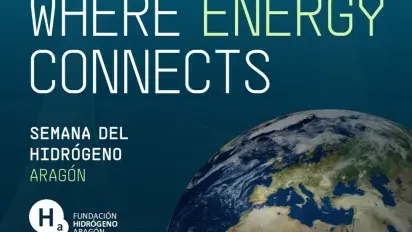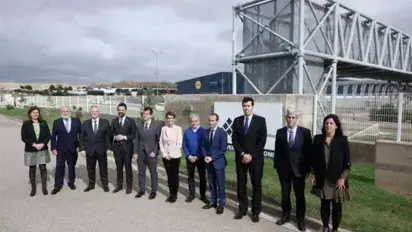The Ebro Hydrogen Corridor is born with the aim to become a benchmark in the development of this renewable energy

- The Ebro Hydrogen Corridor is a project that seeks to enhance inter-territorial coordination between regional initiatives already underway in northeastern Spain. It brings together the Aragon Hydrogen Valley (GetHyGA Initiative); the Hydrogen Valley of Catalonia (H2Valley-Cat); the Basque Hydrogen Corridor (BH2C); and the Green Hydrogen Agenda of Navarre. The main objective is to contribute to the rapid and efficient deployment of the hydrogen economy, generating a leading geographical hub for hydrogen development in Spain.
- SHYNE (Spanish Hydrogen Network), Spain's largest multi-sectoral consortium in renewable hydrogen, is a key driver of this new industrial ecosystem. It will support projects and promote efficient knowledge management and pioneering technology research to position Spain at the forefront of the development of this new energy vector.
- The Spanish Vice-President and Minister for Ecological Transition and the Demographic Challenge addressed the audience virtually and the launch event was attended by the Minister of Economic Development, Sustainability, and Environment of the Regional Government of the Basque Country; the Minister of Business and Labor of the Regional Government of Catalonia; the Vice-President and Minister of Industry, Competitiveness, and Business Development of the Regional Government of Aragon; and the Minister of Economic and Business Development of the Regional Government of Navarre; representatives of the SHYNE project, including Repsol CEO Josu Jon Imaz; and representatives of the participating regional initiatives.
- The Ebro Hydrogen Corridor will promote actions throughout the renewable hydrogen value chain that are complementary and create synergies between the different regional initiatives. To this end, it has set ambitious targets, including the installation of 1.5 GW of renewable hydrogen production capacity by 2030 and the annual production of 250,000 tons of renewable hydrogen products by the same year.
The Ebro Hydrogen Corridor was launched today. The project seeks to enhance inter-territorial coordination and serve as a link between the major regional initiatives for renewable hydrogen already underway in northeastern Spain.
The new corridor aims to play a leading role in the decarbonization of industry in the region while improving competitiveness and attracting new investments. The project is supported by regional entities such as the Basque Hydrogen Corridor Association (BH2C); ACCIÓ - Agency for Enterprise Competitiveness as the entity responsible for the Hydrogen Valley of Catalonia (H2ValleyCat); the Foundation for the Development of New Hydrogen Technologies in Aragon (Fundación Hidrógeno Aragón) as the entity responsible for the coordination of the Aragon Hydrogen Valley "GetHyGA Initiative"; and the Industry Association of Navarre (AIN) together with the Society for the Development of Navarre (SODENA) as promoters of the Navarre Green Hydrogen Agenda.
The driver behind the creation of this consortium is SHYNE (Spanish Hydrogen Network) – the largest multisectoral renewable hydrogen consortium in Spain, launched last January. It plays a key role in the integration of projects nationwide – motivated by the desire to share information and to analyze and study complementary actions that establish synergies between regional initiatives. SHYNE will also provide support to the projects developed through this initiative as well as capacity for knowledge management and promotion of research into pioneering technologies with the aim of positioning Spain at the forefront of the development of this renewable energy vector.
The presentation took place at the seat of the Regional Government of Aragon. The Spanish Vice President and Minister for Ecological Transition and the Demographic Challenge, Teresa Ribera, addressed the audience virtually, explaining that Spain will be at the center of hydrogen production and will become a hydrogen exporter: “The hydrogen economy is here to stay, and the commitment of territories, companies, and industries like yours provide critical solutions that will be able to produce up to 70 or 80% of the hydrogen we need in our country. We know this is key, and it shows the way forward. That is why the Government has given a special role to hydrogen in the Strategic Projects for Economic Recovery and Transformation (PERTE) dedicated to renewable energies, renewable hydrogen, and energy storage. Having corridors that unite the hydrogen valleys, industrial capacity, and end uses to test, expand, and grow are absolutely crucial."
The event was opened by Repsol's CEO, Josu Jon Imaz, who attended on behalf of the chairmanship of SHYNE. "Due to its location, the Ebro Hydrogen Corridor will be a key lever to effectively develop the full potential of this geographical area, with a cross-border dimension of the future hydrogen economy, allowing a greater integration of value chains at European level," he said.
The event was also attended by the Director General for Industry and SMEs of the Regional Government of Aragon and Vice Chairman of the Hydrogen Foundation Aragon, Javier Navarro; the Chairman of of BH2C, Jose Ignacio Zudaire; the Director General for Industry of the Regional Government of Catalonia and CEO of ACCIÓ - Agency for Enterprise Competitiveness, Natalia Mas; the Managing Director of the Hydrogen Foundation of Aragon, Fernando Palacín; the Director General for Industry, Energy, and Strategic Projects of the Regional Government of Navarre, Uxue Itoiz; the Director General of the Industry Association of Navarra, Ana Ursúa; and the Hydrogen Director of Repsol and Chairman of SHYNE, Tomás Malango. All of them have highlighted the importance of this project that will be the backbone for the new hydrogen economy in this area. It will contribute to the generation of quality employment, the attraction of new investments, and innovation around renewable hydrogen technologies, creating wealth throughout its area of influence.
Afterwards, the Minister of Economic Development, Sustainability, and Environment of the Regional Governmentof the Basque Country, Arantxa Tapia; the Minister of Business and Labor of the Regional Government of Catalonia, Roger Torrent; the Vice President and Minister of Industry, Competitiveness and Business Development of the Regional Government of Aragon, Arturo Aliaga; and the Minister of Economic and Business Development of the Regional Government of Navarre and Chariman of SODENA, Mikel Irujo, signed a public manifesto of cooperation and support for this initiative.
The Ebro Hydrogen Corridor will promote actions throughout the value chain, including production, transport, uses, and storage. In terms of renewable hydrogen production, the consortium aims to install a production capacity of 400 MW in 2025 (entailing 1.5 GW of associated renewable generation production capacity), and 1.5 GW in 2030 (6 GW of renewables).
Another of its key lines of action will focus on promoting the end uses of renewable hydrogen, both in the transport sector and for industrial use. The objective of achieving an annual production of 250,000 tons of products derived from renewable hydrogen, such as methanol, ammonia or synthetic fuels by 2030, is especially important. The consortium will also promote the creation of an infrastructure network with 20 hydrogen fueling stations by 2025, with up to 100 points by 2030, to facilitate the use of renewable hydrogen in land, maritime, and rail transport.
In addition, cross-border projects for renewable hydrogen storage and transport will be promoted with Southern France to favor interconnection with Europe and position Spain as a relevant producer in the continental hydrogen market. This will be carried out in coordination with the Working Community of the Pyrenees, a cross-border, inter-territorial organisation.
Renewable hydrogen will be one of the main energy sources for decarbonization of the economy thanks to its versatility. Hydrogen is already used in the industrial sector as a raw material, primarily in refining, ammonia production, the steel industry, and the chemicals industry. All these products will have a smaller carbon footprint thanks to renewable hydrogen. But this gas also has multiple other uses: it is itself a clean fuel - in mobility it is used in the production of synthetic fuels and in fuel cells - and it can also be used to store renewable energy and, thus, help to solve the intermittency of wind and solar photovoltaic electricity production. Coordination between all regional initiatives is a key element to achieve an efficient deployment of the hydrogen economy and to reach national and European targets.
The SHYNE project, under the leadership of Repsol, aims to promote inter-territorial actions and renewable hydrogen projects in all areas of the Spanish economy and promote a rapid decarbonization. SHYNE will deploy projects in ten autonomous communities in Spain and have a total investment of €3.23 billion to develop more competitive technologies and evolve both Spanish industry and its infrastructures towards decarbonization, generating more than 13,000 jobs.
Statements
- Repsol's Hydrogen Director and Chairman of SHYNE, Tomás Malango: "SHYNE member companies and institutions have a strong commitment to develop projects across the entire renewable hydrogen value chain in the four regions of the Ebro Corridor. Having a structured approach with institutional support is important to implement initiatives and promote projects."
- The Minister of Economic Development, Sustainability, and Environment of the Regional Government of the Basque Country, Arantxa Tapia: "The Basque Hydrogen Corridor has taken on great relevance in the context of the current energy emergency. The creation of a hydrogen ecosystem, based in the Basque Country, which allows progress in the decarbonization of the energy, industrial, services, and mobility sectors is more necessary than ever. The project opens opportunities in the economic field, will involve an investment of more than €1.3 billion until 2026, and will generate more than 1,340 direct and 6,700 indirect jobs. Above all, it will accelerate the energy transition and form part of the solution to energy needs. If all the territories join forces in the same direction, the achievements will be of great significance."
- The Vice-president and Minister for Industry, Competitiveness, and Business Development of the Regional Government of Aragon, Arturo Aliaga: "Aragon already applied the approach behind the Ebro Hydrogen Corridor when it developed its hydrogen valley because we have always thought that no region is going to have the heritage of the entire value chain of this technology, which requires cooperation between territories and complementary actors. Our community offers unbeatable conditions for implementing such initiatives and the attraction of investments associated with them, such as a large production capacity of green hydrogen, industry, skilled employment, and the knowledge that comes from being pioneers in this field for two decades.”
- The Director General of Industry, Energy, and Strategic Projects of the Regional Government of Navarre, Uxue Itoiz: "The importance of interregional collaboration in the decarbonization process in Navarre has the Green Hydrogen Agenda of Navarre as a strategic framework. Focusing on 2030, objectives are set at the level of production, infrastructure, industry, transport and, of course, C02 reduction; and with the flagship project of the Agri-Food City of Tudela (CAT), where public-private collaboration is combined.”
- The Minister for Economic and Business Development of the Regional Government of Navarra and Chairman of SODENA, Mikel Irujo: "The Ebro Hydrogen Corridor makes us more competitive and thus we can strengthen the hydrogen value chain, gaining in size and scope to take on projects that we could not do alone, and look to Europe. This public-private collaboration model will make it possible to develop an industry based on this energy vector."
- The General Manager of the Navarra Industry Association (AIN), Ana Ursúa:"Green hydrogen is, without a doubt, a non-polluting energy vector that will boost the decarbonization of industry and its competitiveness. For this reason, AIN's commitment to this matter has been firm and consistent over time. We are contributing to developing the necessary technology for its industrial use."
- The Chairman of BH2C, Jose Ignacio Zudaire: "The Basque Hydrogen Corridor BH2C, joins this initiative of the Ebro Corridor as it has collaborated with other associations from the onset because this way we can promote decarbonization using our technological and industrial strengths. Joining forces undoubtedly allows us to accelerate industrial and technological development processes and now, more than ever, reality highlights the need to provide us with energy generation capacity. Renewable hydrogen will be an essential element in the energy transition towards climate neutrality in the Basque Country, Spain, and Europe."



